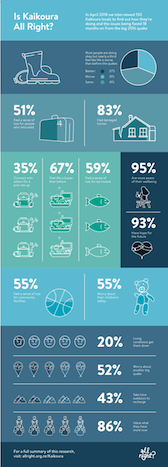The impacts of the earthquakes are still being felt by many in Kaikōura, according to the latest research.
In April 2018 All Right? interviewed 150 Kaikōura locals to find out how they’re doing and the issues being faced following the 2016 earthquake series.
According to the research nearly one in three respondents thought their lives have become worse since the earthquakes, and 40% are struggling to deal with recent earthquakes. In addition, over half of all respondents said they feel a sense of loss in relation to community facilities, changes in the community and the inability to collect kai moana.
All Right? Kaikōura health promoter Rachel Vaughan says the research highlights the ongoing stresses impacting the Kaikōura community.
“It won’t surprise people to hear that ongoing road closures are a continued source of stress for the majority of our community. They are a major reason why nearly half of us (46%) are choosing to stay closer to home than before.”
People in Kaikōura are still worried about another big earthquake, with 52% of respondents agreeing that this was of real concern.
“It seems especially hard for parents, who as well as struggling with their personal recovery issues, are in many cases supporting children who have their own set of worries. Nearly half (47%) of parents say they are still seeing the effect of earthquakes on their children's wellbeing, and 39% say their children are more anxious or clingy.”
Rachel says that while many people are still struggling to deal with the impact of the quakes, some positives have emerged.
“Overwhelmingly, respondents are more aware of the need to take care of their wellbeing, had hope for the future, and appreciated the small things in life.”
91% of respondents said they now valued others more, 93% agreed it was more important to know their neighbour, and 50% said they now spend more time together as a family.
Rachel says the results paint a clear picture of what life is like in Kaikōura, and will help to inform what’s required when it comes to the region’s ongoing recovery.
“While it’s tough for many, it’s important to remember that no matter what life throws at you, there are things we can do to help us feel and function better. Simple things like catching up with mates, getting some downtime, and helping others can make a big difference to our ability to cope.
“And it’s also important to remember that it’s early days for us, with international research showing it can take up to 10 years to recover from the emotional effects of a natural disaster and recovery effort,” says Rachel. “That means it’s all right to sometimes be feeling the strain, the tiredness – it’s a normal experience for communities affected by disaster. There is no ‘correct’ way or time to recover, it’s a process of adaptation and we all do it differently. Looking after ourselves and each other will make a crucial difference,” says Rachel.
Click here for an overview of the research
Click here or on the image for a larger version of the infographic
